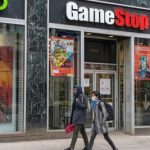GameStop shares surge again as Robinhood restores trading
Shares in companies including videogame retailer GameStop soared again on Friday, as an army of small investors taking aim at Wall Street regained access to amateur share trading platform Robinhood.
The app, weaponised by activist small investors to trap hedge funds in a “short squeeze” that has cost them $20bn on paper by some estimates, had suspended buying of stocks such as GameStop, cinema chain AMC and BlackBerry on Thursday.
But it secured a $1bn (£730m) cash injection from its backers on Thursday evening, which the company said it required to allow its users to resume their buying spree, which began on the WallStreetBets forum of chat forum Reddit.
The decision to permit what Robinhood said would be “limited buys” resulted in GameStop’s shares climbing more than 67.6% on Friday, taking its notional value to more than $22bn, nearly 80 times what it was worth this time last year.
The company’s shares had whipsawed a day earlier, finishing the day 44% lower after Robinhood barred users from buying more stock, threatening the Reddit rebellion.
The US Securities and Exchange Commission also jumped into the battle between small investors and Wall Street hedge funds on Friday, warning both brokerages and small traders that it was closely monitoring potential wrongdoing.
“The commission is working closely with our regulatory partners … to ensure that regulated entities uphold their obligations to protect investors and to identify and pursue potential wrongdoing,” the SEC said.
In the UK, the Financial Conduct Authority issued a warning to British amateur traders thinking of jumping into the fray.
The FCA advised them to use “extreme caution” and warning they could lose money quickly and irretrievably. While Robinhood is not available in the UK after cancelling a launch last year, platforms such as Trading212 offer a similar service.
We’re warning UK investors in certain US listed shares which are being discussed online to use extreme caution. Volatile markets are unpredictable and mean you can quickly lose money. Losses are unlikely to be covered by the Financial Services Compensation Scheme #wallstreetbets
— Financial Conduct Authority (@TheFCA) January 29, 2021
Robinhood allowed buying to resume after tapping investors to draw down at least several hundred million dollars via a credit facility from banks led by JP Morgan and including Morgan Stanley, Goldman Sachs and Barclays.
A spokesperson for Robinhood early on Friday described the $1bn (£730m) injection as a “strong sign of confidence” that will help it “further serve our customers”.
In a blog post late on Friday night in the US, Robinhood said the amount it had to deposit with the clearing house was so large that it had to limit buying in certain securities.
“With individual volatile securities accounting for hundreds of millions of dollars in deposit requirements… we had to take steps to limit buying in those volatile securities to ensure we could comfortably meet our requirements,” it said.
Robinhood also contacted existing investors, which include hedge funds Sequoia Capital and Ribbit Capital, about emergency funding, according to the New York Times.
The move to stop trades had outraged users of the platform, which says its mission is to “democratise finance for all”, and prompted questions from US politicians.
Vlad Tenev, Robinhood’s co-founder, took to Twitter to quash theories that the temporary ban was about protecting hedge funds, some of which pay the company for the right to execute its users trades, known as “market-making”.
“This decision was not made on the direction of any marketmaker we route to or other market participants,” Tenev said. “We plan to allow limited buys of these securities. We’ll continue to monitor the situation and make adjustments as needed. We cannot control, however, the lightning fast spread of information and misinformation that takes place on social media.”
Robinhood’s explanation for why it needed to suspend trading is complex, making it harder for the company to rebuff allegations of Wall Street cronyism levelled at it by its users, celebrities and even politicians as disparate as Republican Ted Cruz and Democrat Alexandra Ocasio-Cortez. By Friday morning, according to analyst S3 Partners, GameStop’s Wall Street short sellers had lost more than $19.75bn so far this year
Sign up to the daily Business Today email or follow Guardian Business on Twitter at @BusinessDesk
Many of the Robinhood traders haven’t been buying shares in the traditional sense but using options, essentially borrowing from the company to fund their trades.
Like any broker of financial instruments, Robinhood processes those trades via “clearing houses”, which want to know the broker can make good on those trades if everything goes wrong and its customers can’t fund their own positions.
The sheer volume of trading in firms such as GameStop – and the wild movement of their shares on the markets – meant Robinhood was in danger of having too little money on hand to do that.
That, says Robinhood, is why it had to suspend trading on Thursday. Raising $1bn from investors has put the company in a position that satisfies clearing houses that it has enough money, allowing trading to resume.



